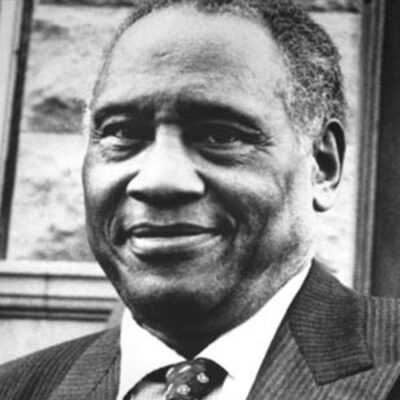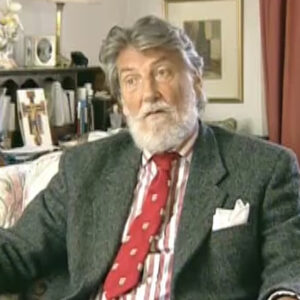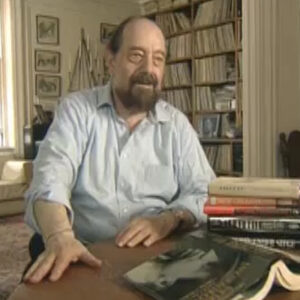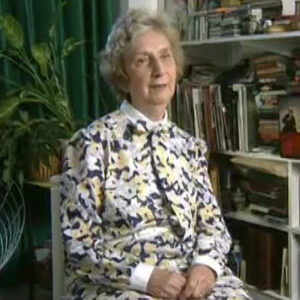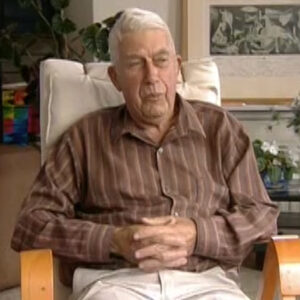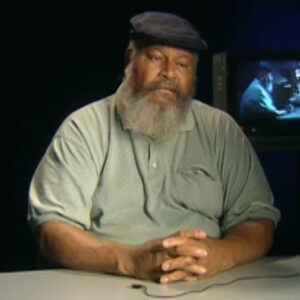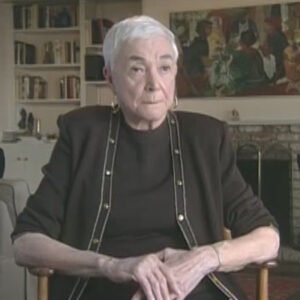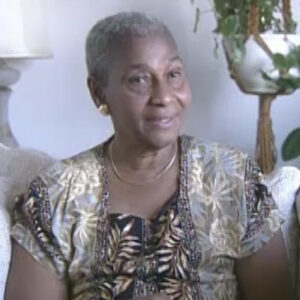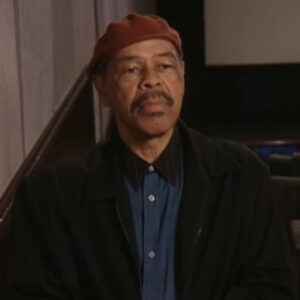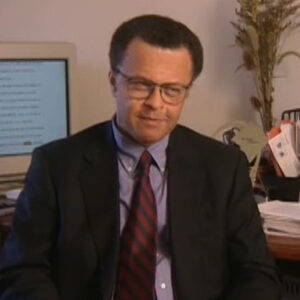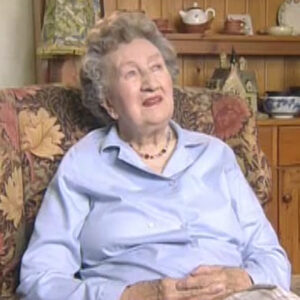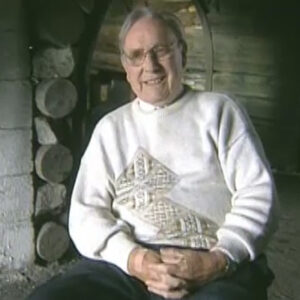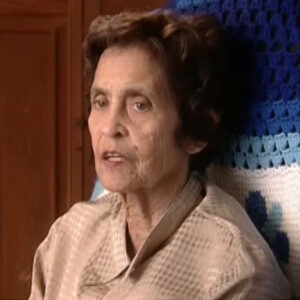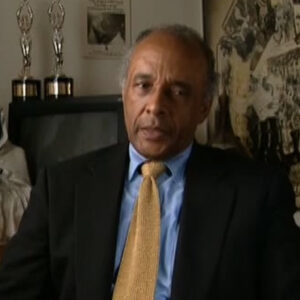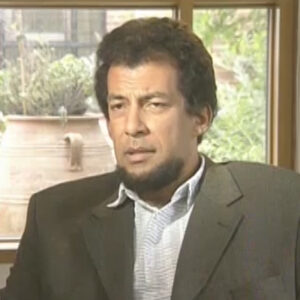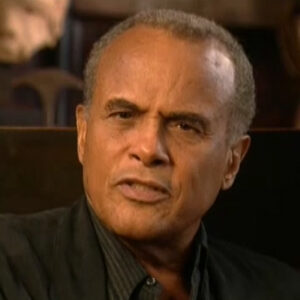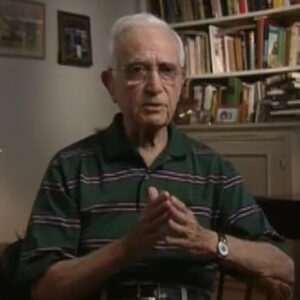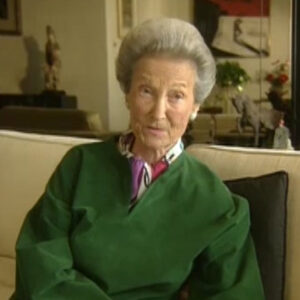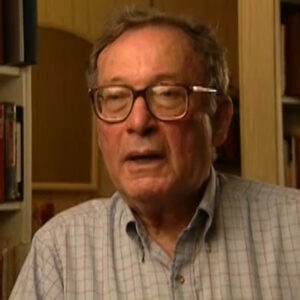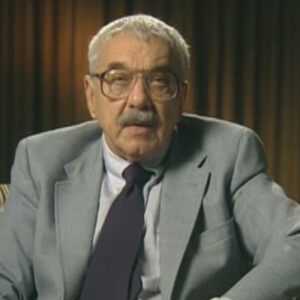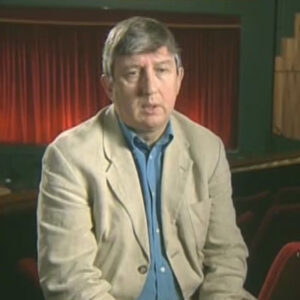Speaker Why did you choose or how did you come to write about Paul Robeson?
Speaker To my surprise, his son, Paul Robeson Jr., came to me or rather to my agent, we at that point had the same agent and the way he later told that he had been looking for a long time for a biographer and he had kept the family archives closed to scholars.
Speaker And he read various people talk to various people one day in my agent’s office, he was waiting in the living room for her to get off the phone, and he took down a book or two of mine.
Speaker And as he tells it, he was immediately taken with the writing. He never fully laid out his reasons for asking me, all he ever said was he he thought I had a subtle understanding of character and I had a theatrical background of my own so I could tie into that aspect of his father’s career. And he liked my my prose.
Speaker Yeah, now.
Speaker How long did it take you to write it and, uh.
Speaker I mean, you’re talking to a perfectionist who’s never happy with anything. And. It was about five years of research and about two years of writing. The writing went through a number of drafts, large number. And in fact, the research continued right, right through writing the drafts. So in all seven years.
Speaker Uh, let’s just start with for now a little bit of we in our research, we found people, you know, a lot of stuff about the Somerville’s stuff and.
Speaker But what I’d like to start with is his year at Columbia and.
Speaker Not a lot is not I mean, not a lot of people know exactly what he did then. What was his life like as a student?
Speaker There’s very little known about his his his law school career. I found his record in the Columbia archives. What what that shows is that he didn’t do terribly well in law school. He didn’t do badly, but very few days on his record. And that, I think, is because he never liked the law. He was really totally unsuited for it, and after he got his law degree and was hired by a white firm, it very quickly became clear to him that he would never be able to have a significant law career.
Speaker What happened was within a couple of weeks of of going to work for this firm, one white secretary, he called her in the office and said he needed for her to take down some dictation. And she said, I don’t take dictation from [Unrecognized].
Speaker And Paul went to the head of the firm who was apparently very sympathetic and the documentation is slim here, but also apparently offered to set up a branch of the office in Harlem.
Speaker But he told Paul that none of the firm’s white clients would really allow him to represent them in court, especially if the case was a significant one. And so knowing that, I mean, Paul was ambitious and knew he was multi gifted and he wasn’t interested in joining a profession in which he couldn’t reach the highest rungs from the very beginning, he had a, uh, a sense of himself that, I mean, as a as a I’m going to be somebody.
Speaker That.
Speaker I think so, I think that that was bred in by his father and the family in general, Paul’s brothers and one sister, they he was the special person in the family. Paul said oppositely that his older brother, William, was, in fact the smartest person in the family, but but Paul and his father lived alone after the others left home as adults and they formed an especially strong bond. And Paul seems to have adored his father, admired him enormously, and they essentially spent every evening together, you know, reading, learning Latin. And his father bred into him a strong self-esteem. He told them that he was as good as any white man and there was nothing that he couldn’t do if he set his sights on.
Speaker When he left Columbia, he was his. Mean means living in Harlem. You have was a gay blade around town. I mean, did he have a social life with the man on the scene or.
Speaker Again, it’s very hard to document. I found when researching the book one of his girlfriends who was then in her 90s, and she. She suggested he was very active socially. He was already a hero by the time he arrived in Harlem, he was a hero. He was known for this extraordinary record that he had compiled at Rutgers twice in all-American football player, something like, you know, a dozen varsity letters. Also a distinguished scholar at Rutgers gave the valedictorian. I mean, he already stood out so his or his arrival at Harlem was instantly noted.
Speaker Um.
Speaker OK, now what at this point to me. And I have to ask you about this, his meeting and courting and marriage is a crucial release of all of his life.
Speaker I mean, it’s in your book, but describe it for me just just to start this. I have it on tape.
Speaker You know, when did you meet him? Did she go after him?
Speaker No know there are various accounts of where they met. I don’t think anyone’s going to finally pin that down. They may have. I mean, I think the likeliest candidate is when Paul was playing professional football to help finance law school and he got a very bad injury in his thigh and he was brought to Columbia Presbyterian Hospital. And I located the doctor who treated him. And the doctors the doctors version, anyway, is that that he decided that St. Paul would like each other.
Speaker And so he brought as she was working in the lab at Columbia. And so he brought F.C. to Paul’s bedside and introduced them. And he takes credit for the beginning of the relationship and claims that they instantly took to one another.
Speaker Mm hmm. In fact, I think their their personalities were very different.
Speaker And for a while that difference worked to the benefit of both and the relationship as he was hard driving, aggressive, tough. She would say anything to anybody. She would knock on any producer’s door. She would argue over any contract. She did all the front work, in other words, for Paul in the early years of his career. And she was very good at it. And she had a lot to do with that career taking off her when Paul was still only in his mid 20s. But she was she didn’t have Paul’s depth. I guess that’s the best way I could put it.
Speaker There was nothing spiritual about S.E. There was nothing soulful, really, about M.S.. She was she mostly judged people on the surface and mostly lived her own life on the surface.
Speaker Now there are I should quickly say that there are friends of asses who are still alive, one of whom, Annette Rubenstein, when the book came out, told me there would now have to be a feminist biography of Essy because I had not done see justice. What I just said about Essi is not all that I say about her in the book. In fact, I admire a great deal. And I think in the context of her day, she achieved a remarkable amount for a black woman, for a woman.
Speaker And she gave up a lot. She wanted to be a doctor and she gave up a lot for poor in order to be his manager and push his career.
Speaker My question is, why does he do that? I mean, not tactically why, but at the core, what do you want?
Speaker She had this drive. She wanted to be somebody and then she sort of puts it all behind and pushes him, why do you think that?
Speaker On the largest level, it’s because that’s what women did then and to some extent still do. That is when they find a man they fall in love with and marry, their career goes on the back burner and they devote their lives to taking care of him.
Speaker Domestically and in some cases in terms of a career.
Speaker I also think, though, that Southsea recognized immediately how special Paul was, and probably this is a best guess, probably understood that her gifts were no match for his, that he was destined for real fame and glory, and it was better to hook her star to his than to try to become a star in her own right.
Speaker OK, that’s good. That’s the most concise affirmation I’ve heard a lot of good because I’ve heard harsher parts right now.
Speaker Oh, yes, he was a very difficult woman, especially as she got older and lost her looks. And as Paul essentially left the marriage, even though they remained formerly married, she could be very edgy and hard to get along with.
Speaker Um, what’s the problem with.
Speaker OK, if you could just repeat that, that she was brave and particularly she was an extraordinarily brave woman toward the end of her life, she developed cancer and toward the end knew it was terminal and decided to keep that news from Paul and indeed from almost everybody because she wanted Paul to be spared, as he did a lot of that throughout her life, trying to protect and spare Paul.
Speaker And she also knew how reliant he then was on her because he himself was very ill.
Speaker But now, throughout the quote unquote marriage, were other women in and she didn’t.
Speaker She didn’t seem to.
Speaker She didn’t want she didn’t he didn’t do what she did for him. In other words, he he hung with these other woman women and.
Speaker You know, he didn’t necessarily spare her.
Speaker I mean, what can you think about the psychological dynamics about why he did that?
Speaker As he kept a diary for many years and she was not above lying to her own diary in the sense that she was interested in self glamorization, enlisting all the celebrities who they knew socially, whose parties they were at, whose dinners they attended, she wanted all that on the record. So the diary is a semi public document, but she also would confide some of her strongest, deepest feelings to the diary. When she discovered that Paul was having an affair with Peggy Ashcroft in the early 30s, they were performing Othello together, he was Othello, of course, and she was Desdemona when she discovered that she writes very bitterly in her diary about the affair so bitterly as to suggest to me that that was the first time that Southsea became fully aware of how extensive Paul’s sexual life was outside of marriage.
Speaker There’s no way of knowing for sure, because Revel’s Katan told me that when he and Paul were young men in the village in the 1920s, they often went out together. I’ll avoid the words that Revel’s used because he didn’t want them in the book and I honored him by not using it in the book, but I can say it. But, you know, they went out hunting together all the time, according to Revel’s. Knowing how shrewd he was, it seems to me difficult to believe that the first time she got any hint of pause extracurricular activities was was Peggy Ashcroft.
Speaker But maybe it’s the first time that she became aware that these were more than one night stands, that that this this relationship with Peggy had emotional overtones and was really threatening of the marriage.
Speaker Uh.
Speaker Still, um, well, give me some idea of the events that led up to the Emperor Jones and his reception on Broadway. How did that I mean. Well, at the end and in the managerial spot then. Yes.
Speaker Yes. And, uh. She you mean the stage version? Yeah, she in her book, Paul Robeson Negro, which came out in 1930. She talks about, you know, I’ve got my days confused. She and Paul would constantly read the script to the Emperor Jones out in their apartment to help Paul memorize the lines to the point where, as S.E. said, she started to drive her mother, who was living with them crazy.
Speaker But she was very much, you know, not not only a manager, but a coach.
Speaker She had very good theatrical instincts, she she encouraged Paul to turn down a number of properties that she was right. They didn’t go anywhere and they weren’t worthy.
Speaker But I don’t know what more you want about Amber Jones.
Speaker Well, I guess that was a way to get into her management. I mean I mean, it’s it’s a marriage, but it’s it’s almost a business, you know what I mean?
Speaker And. Uh, to what extent did you think that Paul knew that and allowed it because he benefited from it? I mean, it was it was was could it have been as cold blooded as that?
Speaker That that’s like asking or the way it resonates for me is to poor lover. I mean, it’s one thing if you if the wife you love is doing a lot for your career, if you don’t love her and she’s doing a lot for your career and you stay married to it, then it seems far more.
Speaker Calculating.
Speaker I think there’s a lot of disagreement over this.
Speaker I think in the early years of the marriage, Paul and SC were mutually in love.
Speaker He may have had I believe he did have serious doubts about tying tying himself down in marriage to anybody.
Speaker So it’s probably only because of eskies manipulations that they end up actually tying the knot. But I believe from the letters from those years, Paul’s letters are full of love and devotion.
Speaker I don’t I don’t know, but I don’t think that that lasted very long. I think.
Speaker Well, I think even even during the period when he was in love with her, he was nonetheless having extramarital activities. But I think probably he wasn’t really interested in see within again, this is just a figure I’m pulling out of the air with him, you know, whatever, five or six years he remained, I think, bonded to her in some ways.
Speaker Partly in a managerial way, but also as allowed for Paul to be somebody once said to me.
Speaker Paul could remain, you know, his beautiful, gracious, charming self because as he was doing all the dirty work.
Speaker And Paul didn’t have to bother with, you know, all the all the ugly details of, you know, agents and contracts and movie deals, and he could just let as he’d take care of all that.
Speaker That doesn’t mean that by nature, Paul wasn’t, you know, charming and generous and magnanimous, but some of some of those traits may have worn a little thin if simultaneously he was having to grub around doing all the contract work.
Speaker When did that change? I mean, when did she stop being a manager and when did Paul decide to change energy, so to speak?
Speaker When did that change? Why do you think that happened?
Speaker I don’t have a clear cut date for you on that, I would think by the late 30s. After they returned to the United States.
Speaker And that may have been to some extent a mutual choice because SC was taking a degree in anthropology. She was herself trying to write plays. She had written two books. She had some real hopes that she could develop an independent career. And in order to do that, that meant she had to cut back on her managerial work for Paul.
Speaker But also, I think that.
Speaker Became reduced because during the 30s, Paul.
Speaker Actually asked for a divorce at one point.
Speaker When he when he fell in love with Yolanda Jackson, he did fully intend to marry Yolanda and I think that must have been deeply wounding for Essie, though she had already known about the Peggy Ashcroft’s. Still, she didn’t expect to cease being Mrs. Paul Robeson, which she very much enjoyed being.
Speaker He was by then an international star.
Speaker Um.
Speaker What do you think the his first concert in Greenwich Village, sociologically, I mean, career wise, it was important for him, but his choice of music and the way it was presented.
Speaker Could you talk about the significance of that concert from those two points of view?
Speaker You know, you’ve you’ve had a near blank spot in my memory. OK.
Speaker In other words, this is what I remember the day in 1925 and promising playhouse.
Speaker But, uh, no, no, no. Oh, you don’t mean that one at the concert.
Speaker Yes, but but it was in the theater, the premiere someplace.
Speaker But, um.
Speaker The kind of music, you know, his presentation of Negro spirituals and and was that a normal thing to do then and the style that he presented?
Speaker And I said, yeah, I see. Yeah, yeah. It was I think the first time that any black artist had devoted an entire concert to black spirituals and work songs.
Speaker There had been groups like the Jubilee Singers from Fisk who had been performing such concerts, but never before did a single artist do it, though apparently there is some evidence that before the 1925 concert, just before it, Paul had as kind of as a kind of tryout, performed that concert elsewhere, like in Ocean Grove, New Jersey. They, in fact, are recreating his 1925 concert there. It looks like it’s going to be a marvelous event. Yeah.
Speaker So, um, so, I mean, now whose idea was I mean, did you did you find out whose idea was that to do this? I mean, to do that kind of music? And they were they conscious of being the first to do this? It’s hard to pin down this point.
Speaker I think an enormous influence was Larry Brown, who was Robson’s accompanist for much of his career. Larry Brown had already become deeply immersed in the spirituals, he had even published some of them.
Speaker He was a scholar of the spirituals as well as being a performing artist. And as soon as the two men met, it was very clear that they were well suited to each other artistically and personally.
Speaker And my guess is it was Larry who initially got Paul interested in. The spirituals and the work songs later on, once Larry set him going, as it were, Paul became so interested in folk music in general that he announced he would no longer perform classical white European music. He was that he would devote the rest of his career to performing folk songs from various nations.
Speaker Who was Larry Brown? I don’t really know too much about him. We don’t know.
Speaker Yeah, you know, I mean, do you know I mean, I read your book, but could you just tell him what you know about the little I’ve been able to learn is he was a gay man. He was.
Speaker Quite shy, did not particularly enjoy socializing.
Speaker Not a recluse. I mean, he wasn’t a solitary he had lots of friends, but he didn’t like necessarily being constantly in the public eye. And he he also I was told by someone, he also very actively disliked white people. And since Paul, socializing was very often either with a mixed group or with whites, Larry chose not to to join.
Speaker On those evenings, they met in London. What was he doing there?
Speaker He was he was researching spirituals. He was also. Talking to other black artists who had settled in London because of the the awful racial climate in this country, people like John Payne, but there’s very little known about his actual performance history during the 1920s.
Speaker He did earlier in his career accompany Roland Hayes.
Speaker So he was poor, was not the very first artist he worked with publicly.
Speaker OK, let’s switch.
Speaker You know, I mean, I know people ought to be true to themselves as much as they can, so I think she’s suffering. I mean, maybe even ironically, because she didn’t go for herself, although in the middle she did write 150 books and she tried. Yeah.
Speaker Yeah. Nothing much worked out for.
Speaker Yeah. Which maybe might have been a worst nightmare.
Speaker Because she says, what we got to get out from under the shadow. She tries it and then, yeah, that’s rough.
Speaker Yeah, I think that’s why as an older woman, she was much more difficult and as a younger one.
Speaker Just to pick up, could you tell me how Paul, as he does, how he discovered about the relationship between Paul and and apparently as he opened a letter from Peggy to pour, uh, it isn’t clear whether he had permission to open Paul’s mail.
Speaker It’s possible that was that involve some sort of.
Speaker As he found out about the relationship with Peggy Ashcroft by opening a letter that he had written to Paul.
Speaker It’s not clear, though, whether or not Peggy Sue had Paul’s permission to open his mail because she was, after all, his manager and Paul didn’t like dealing with dailiness, Paul all his life relied on other people to take care of all the chores of daily living, and he might have given ASIC carte blanche in terms of opening his mail. I sort of doubted if he knew that. That he and Peggy were already writing to each other. He certainly would not have wanted to open those letters. So my my guess is it’s probably more the other way that he was an extremely controlling and nosy human being and she wanted to find out what was going on and open the letter and read it.
Speaker And the other thing that interests me is it seems to be one of those this could have been the break from the co-dependency syndrome was the Yolanda Jackson with a fair bit incident. How long did that last and what was it about?
Speaker Well, you now know more about that affair than I do. I’ll give you a version that’s in the book and then you can add your stuff. Yeah, uh.
Speaker Paul and others who knew Paul well said that Yolanda Jackson was a great love of his life. He never after Yolanda proposed to a woman, he would never even consider marriage, even though he grew deeply attached to other women later in his life. Women like Helen Rosen for the diamond or the hug and et cetera, Paul had been so badly burned because what happened was Yolanda simply stood him up. They were supposed to rendezvous, leave for France, marry, apparently spend the next year in France and ASIC had officially agreed to a divorce. Reading as his comments in her diary about the affair, the divorce, should she let him go, should she deny him the divorce? It’s very clear that that she changed her mind constantly.
Speaker And went when Paul made it very clear that he was going to leave her and marry Yolanda at the very least, leave her as he finally decided to be big about it and to give, you know, her blessing.
Speaker And she then turned a very contented face to the public and to their friends. She said something like, Paul and I have had, you know, 10 wonderful years together. Matrimony may well be in its traditional form, an outmoded institution. Maybe ten wonderful years is all that any couple can count on. And I’m grateful I have those years and I wish him well in his new marriage.
Speaker This was a public. Yes, she actually wrote about wrote that or sent it to a reporter, I think.
Speaker Yeah. Now, who is Yolanda Jackson to talk to? She.
Speaker She was apparently an actress, a very beautiful woman, white. Who never had a career, she would get bit parts here and there, but never had a substantial career. I don’t know where they met, how they met, you may never know. I do know that they were passionately in love, thanks to Rupanyup Davis, who sent me letters from Yolanda and to Yolanda from a later period of up to 1950 roughly.
Speaker It seems clear that Yolanda never lost her love for poor, why she backed out at the last minute from the marriage. There are several theories. One that I had told to me with great conviction was that Yolanda, in part due to family pressure, decided she simply could not face up to the difficult life that lay ahead if she was going to marry a black man, even if the black man was Paul Robeson. But I have also heard that, in fact, Yolanda’s family was one of the few places one could go. This is from Rupanyup Davis, one of the few places one could go in those years in London in the 1930s and find blacks and whites mingling socially. So it was, in fact, a family more devoid of racism than was almost everywhere else commonplace.
Speaker So the answer is, I don’t know. I do know that from the later letters that she deeply regretted the decision, she remained very much in love with Paul.
Speaker Paul would see Paul set all the terms, judging from these letters anyway, Paul said all the terms as to when they would meet, where, how long, etc. and Yolanda had no say in the matter. Long periods went by when he didn’t see her at all. This is after the after they broke up.
Speaker This is in the 1940s and at least as late as 1950.
Speaker Yeah, it was deep and Yolanda claimed that they remained. I mean, she implied in these letters that they remained sexual lovers when they would meet, though, was very infrequently. And she also claimed that she gave birth to a son by Paul. But the child died at a very early age.
Speaker Have you found any documentation?
Speaker I found no documentation to support that. No, but that doesn’t mean it doesn’t exist or that it isn’t true.
Speaker Yeah, well, Paul, Paul was a man who one of his close friends described to me as somebody with a thousand pockets and not even Paul, this friend said, knew what was in every pocket. So Paul Paul operated on many levels in a wide variety of circles. And he didn’t want his friends from one life to know about his friends in another life. And I think that’s one reason he wrote so few letters in his lifetime and kept no diary and in fact, left a very scanty paper trail in general.
Speaker But he was such a public figure, I mean, I mean, he I mean, it’s got to be a crossover at a certain point, and especially during this political phase, you know, he’s making public statements. He was, you know, and I mean, also his life. He was always getting in pictures. He was very much an actor and a public persona. So how could you expect to get away with it?
Speaker Yeah, yeah. I think there were rumors about him all the time. I think possibly it was a different era in which.
Speaker Private lives of the stars or the politicians were not investigated with the same kind of furious dedication that we’re now familiar with.
Speaker And so I’m trying to think of other Hagen, who was Paul’s lover in the 40s when they were performing Othello together. They were raided by Udi’s husband, Jose Ferrer. And and the night they were raided, Ouda describes Paul as desperately upset because this would hit the tabloids and would ruin him politically. It would ruin his standing in the black community primarily that I mean, it was already known that, you know, he was seen frequently with various white women, but for the whole story of his relationship with Ouda to come out and indeed it did subsequently in confidential magazine, that would that would be a very serious blow to his public standing and to his standing with his own people.
Speaker So it’s not as if Paul was unconcerned about his affairs with white people.
Speaker I think, Paul.
Speaker It’s very hard to evaluate, but but I think it’s a measure of poor self-esteem. And entitlement, his sense of entitlement. Very unusual for any African-American male or female in those years when lynching was still a commonplace. But I think thanks to Paul’s father, who bred into him this deep sense of his worth, I think Paul felt entitled to whatever anybody else had, whether it was meals in fine restaurants, staying in the best hotels or sleeping with the most desirable women. And somewhere he must have known that there was risk involved, but people, people who feel deeply entitled, even though they’re they’re aware of the risks, usually will run them because they tend to also think they’re untouchable.
Speaker Because their worth is so profound, nobody can bring them down.
Speaker So now on his social life, for example, let’s say.
Speaker This one is becoming a star 20, right? I mean, who else did he meet and how did he did he did he and he or maybe the plot to get into that, you know, cafe in that cafe society that I like or whether they was because they were.
Speaker Yeah, I don’t I don’t think they they had the plot, I think in 1925, double openings with the Provincetown players and this extraordinary concert success. Paul was instantly a star and everybody wanted him at their parties. He he didn’t have to lift a finger to break into society, be it be a black or white. Walter White, for example, instantly took him up. Karvan victim took him up. And any number of others, I mean, people were thrilled if Paul showed up at their party, it would make the party.
Speaker What’s your take on his participation in the black? To the black celebs, but also the working class, like the common people who like him because he was a star. You have from your research and your take on it was he was a cross-class, cross-class persona.
Speaker It depends on the years and the these are important here, I think. So if it was, say, during the Harlem Renaissance period during the 1920s, Paul’s political consciousness had not fully developed. It’s only at the end of the 1930s that it’s fully developed. And by then he is more than well aware of class issues. He had publicly declared himself a friend of the Soviet Union whose purpose was to create a classless society. But in the 1920s, like so many other black intellectuals, including Dubois, are poor, believed for a short time anyway, poor believed that if individual blacks would distinguish themselves in a variety of fields, whether it be sports or music or theater or film, they would thereby demonstrate that blacks were capable of doing anything as well as any whites. In other words, art would prove the solvent for racism. So their main focus of concentration should be becoming first rank artists and then so the theory went that would trickle down and help the black masses because it would dissolve, at least to some extent, American racism. That turned out not to be true or true to such a minor degree that it didn’t make a serious dent in American racism.
Speaker Uh. That’s an estimate and that’s the early period. Yeah. Uh. This isn’t this is really is good to hear you say this.
Speaker I mean, they seem to read it, but when you say it has more violence, it could make makes more sense.
Speaker OK, now, Kolvenbach the later turned on him. Yes.
Speaker Someone over what? I mean, what’s the problem with it?
Speaker It is politics because it got rejected or.
Speaker Van Van victim was.
Speaker Uh.
Speaker A difficult man to like, he was a powerful man. So a lot of people pretended they liked him because they needed his influence.
Speaker Then Vectron expected people to pay deference to him.
Speaker And during the 1930s, Paul and AC were essentially living in London.
Speaker And there was some contact maintained, but it was minimal. And when Van Victim’s wife, the actress Marinus, find him, Aronoff visited the Robson’s in London.
Speaker She sent back a very hostile letter to call, essentially saying, you know, they’ve got other fish to fry. Now they you know, we have served their purpose was a very nasty letter about how, you know, all Paul is interested now is talking about himself and his accomplishments. He doesn’t care about his own friends. So when and if they return to the states, let them contact us. We’ve done enough for.
Speaker And he did. And he he did not contact them. Them. I’m sure did it made him very angry.
Speaker From your research, how was he treated during the run when he was overseas?
Speaker How did the blood did the black press deal with him at all? Clues out of the country or.
Speaker What did they report?
Speaker They certainly reported on his movies. And as he became more and more political.
Speaker After the mid 30s, they they would certainly report on speeches he had given the organizations he’d become part of, etc., was he?
Speaker This is a man of a thousand pockets image, was he? Did he do any kind of reaching out to black press or nurturing to kind of make sure that the the the masses of black people got his message, or did he just speak and figured that they would just in terms of like your research, Paul was never a person who.
Speaker Pushed himself on the public, that is, he never felt he had to. After all, he made it at such an early age, mid 20s, he was by that age, he was surrounded by officers and sycophants and famous people trying to get his attention. He never had to make any effort to the extent he had to, as you know, any anybody in film or who does film or stage work does sometimes have to push themselves for a role. It was like who would do the pushing? Paul did not receive anything like a uniformly favorable black press. A lot of his movies were roundly condemned in the black press, and Robeson was very harshly treated for portraying what the press, the black press would call a standard stereotypic roles.
Speaker But he still is popular, though.
Speaker Well, he was yeah, he was one of one of the great ones that people could point to where I mean, one of the few who had gotten through the net, the net of racism and thereby represented at least some minimum hope that others could follow did in relation to that, when he announced he publicly announced he was going to marry Yolanda was a common knowledge and that any of his friends may not be able to do it, you know.
Speaker Maybe the best thing to do.
Speaker I haven’t seen any evidence of either of those things that he publicly announced or that his friends warned him not to. Which doesn’t mean they didn’t. Later on, there is some some minor evidence that Ben Davis, who was one of Robson’s probably Robson’s closest African-American male friend and high up in the Communist Party, there was there is some suggestion that Ben Davis on various occasions warned Robeson to appear less often in public with white women or to be less demonstrable in public. As I’m remembering it, Paul never again considered marriage. So there was no reason for Ben Davis to warn him against marrying a white woman. I think Paul had come to the conclusion on his own that there was there was no point in getting married because that probably would have been to a white woman and that would have raised all kinds of hell. I mean, Paul, Paul was attracted. He said so in so many words to Helen Rosen when they were lovers, he said he was almost exclusively attracted to light skinned women. Occasionally, that would be an African-American woman like Freddy Washington, who was very light skinned and had very Anglo-Saxon features. But primarily he was attracted to white women.
Speaker What do you think that was?
Speaker I wouldn’t go near that psychologically because I think there is so there’s so many, you know, standard and suspect explanations given for that, you know, that he was he was fucking the white race, you know, and all that stuff.
Speaker He’s going past that.
Speaker I mean, how do we account for anybody’s erotic preferences? Why does someone like large breasts and someone like small breasts? Why do some men prefer intercourse and some men prefer oral? I mean, go and try to figure out your own erotic preferences and you’ll see how nearly impossible that is. And you know yourself very well, you’ve got a lot of evidence for poor, we have almost no evidence. So I think it’s a mistake to engage in psychobabble.
Speaker Yeah. Um, all right, let’s of.
Speaker During the World War two years, it was pretty popular, but very popular one, but he had just come back. From Europe and Asia, the Spanish Civil War antifascist, so, you know, that kind of world, why was he I mean, was he patriotic?
Speaker But he also had this baggage. Political baggage in Europe. You see a conflict in that?
Speaker No, it’s I think it seemed for a time, a very brief time, and the only time in Robson’s political life where everything was or might come together. After all, the United States and the Soviet Union were allies during World War Two, and the American press was full of praise for the Russian experiment, the Russian people, Russian democracy. Plus, Roosevelt was the most radical president by far that we had seen in.
Speaker I mean, I’d have to check this, but in the 20th century.
Speaker Robe’s Roosevelt. Promises were certainly not all, man, but what he promised in its in its day in the 1930s was considered very left wing and of course, Eleanor was even to the left of Franklin. And Robeson had some real hope and I think good reasons for the hope that Roosevelt would make good on all of his promises. Which would help black people in this country enormously if you followed through. Like letting blacks for the first time be voters in AAA elections. And I think he hoped that the country would move progressively more to the left.
Speaker Especially if the United States remained friendly with the Soviet Union, that the Soviet Union would have a significant influence on on this country’s ideology. Now, with Roosevelt’s death and the advent of Harry Truman to the presidency, it becomes very clear that that that hope is shattered. Harry Truman and Winston Churchill both very rapidly turn into cold warriors Russia, not now that fascism has been beaten back. Russia is redefined as the primary enemy. It’s communism now that’s the threat. No longer fascism. Which means anybody who was sympathetic to the Soviet Union is immediately under suspicion and anybody who was a member of the Communist Party is almost immediately denounced as a traitor. The climate of opinion shifts very quickly in this country from, say, 1945 to 1948.
Speaker Well, before, let’s say twenty five men in here, what give me an example of the kind of popularity that Wilson had, any kind of activity that had about Americans. But how was he? Was he like a you are a pop star, sort of like the like a like a red, white and blue Michael Jackson tight lid on that level.
Speaker All right, first I’d have to say what I think of Michael Jackson before a jury of your peers was like a real pop star like Elvis.
Speaker He was, I would say in the 1940s, Robeson was the most famous black man in the world.
Speaker Even in terms of film, I forget the year of the poll, but but Rabson actually came in something like tenth in terms of the most popular international star for mass audiences. And of course, he was the only black person who came remotely that high on the list.
Speaker You know, he was hugely in demand, I mean, he got he got major concert fees, his concerts could have been booked twice over every time he crisscrossed the country.
Speaker He was he was considered by white America to be the model Negro, the word then used by somebody who behaves with great decorum and dignity, somebody who dutifully went out and sold war bonds, thereby declaring that he believed in the country’s purposes and in the country’s values. And. His previous statements about socialism and his commitment to the Soviet Union were conveniently ignored because Robeson was then serving the purpose of white America. He was their representative black. He was playing precisely the role they wanted him to play. Soon after, he crossed the line an impermissible line as far as white America was concerned. And thereafter he was denounced as the opposite of a model, but not in broad popularity.
Speaker But he was also a serious artist. He was something of a scholar. I mean, he did a lot of research in terms of the folk music of the world and kept incorporating that music into his public concerts.
Speaker And he was seriously respected by fellow musicians and theater people as a front rank artist, not simply as a pop figure.
Speaker Now, what, what, what what do you from your research, what was well, if it was America’s golden boy for a while.
Speaker How was he seen as black people? Did they also dig into.
Speaker For these that period.
Speaker I’m I’m struggling with a difficult comparison.
Speaker That I’m not sure is valid, so I’ll struggle with it on camera and you can do with it what you want.
Speaker I think Rabson became even more of a black folk hero, a hero to so-called ordinary African-Americans after he crossed over that impermissible line and became more and more radical politically and after he was denounced by the white establishment as essentially a traitor to his country.
Speaker I think Prix’s say 1945, though, he would get some very sharp abrading in the black press for playing some stereotypic roles.
Speaker He was certainly well regarded. I mean, he was a considerable hero among the so-called black masses. But I think that took on the dimension of real awe and worship once he instead of previously he had during World War Two, he had joined hands with the white establishment. They were working in tandem to push a common cause to destroy fascism. After the war, he was denouncing the white establishment.
Speaker And he was he was giving voice, I think, to a lot of the most profound grievances that African-Americans had long felt and with the established black leadership had not been vocalizing.
Speaker The established black leadership was terrified of Robeson Post 1945 because Robeson, what there were he was far too radical for them. The black leadership in those years and with some reason given the depth of racism in this country, they felt the only way they could get any favors from Washington, from the white establishment was by humbly petitioning for them.
Speaker And Rabson, as an outspoken Soviet sympathizer, was a real danger. At the same time, he was an enormous asset. As Bayard Rustin said to me.
Speaker Publicly, the black leadership like Adam Clayton Powell, Mary McLeod Bethune, Roy Wilkins, Walter Away publicly, they all denounced Robeson in the late 40s. He does not speak for black America.
Speaker He speaks for Paul Robeson and Roy Wilkins even went so far as to say he hasn’t remotely earned the credentials to be speaking for black America. He’s been tending to his career. He hasn’t been doing, you know, the dirty organizational work that the rest of us have been doing. But Bayard Rustin told me that A. Philip Randolph got asked Rustin to convene a secret meeting of 20 of the most prominent black leaders, and there they decided to go public in denouncing Robeson, not not a collective joint statement, but each would go back to his or her constituency, like Adam Clayton Powell went back to his pulpit at the Abyssinian Baptist Church and read Robeson the riot act.
Speaker But what Rustin also told me was that privately, many of these same black leaders, not all of them, some of them were conservative, many of them deeply admired and.
Speaker Not only for what he was saying, but for his courage in saying it because they realized he was totally jeopardizing his career and his standing in public life, plus they admired him and were pleased by what he was saying because he made their lives easier. They could always say, hey, this maniac, Paul Robeson is waiting in the wings. He’s trying to convert black America into becoming reds. You people better deal with us. Our demands are really very modest. And if you don’t meet those demands, then the black masses are going to start listening to Robeson because they’ll give up hope. I mean, if you can’t even pass an anti lynching law in the Congress or Fair Employment Practices Act. It’s going to make a great deal of sense to the black masses to go red so and serve the black leadership very well, and they knew it even even while they felt they had to publicly denounce all of this meeting. You know, when it was and what happened, it was right after Robeson gave. A famous speech in Paris at a world peace conference in 1949. Where it took place, I don’t know.
Speaker What was the beef, OK, what was Robson’s reaction to?
Speaker What was Wilson’s reaction to the furor created by his his Paris? Statement Arizpe peace statement, I mean, how did he react to all the.
Speaker Furor that erupted.
Speaker It’s such a complicated incident. I don’t know if you want me to go into it because it’s OK, I.
Speaker The speech that Robertson gave at the Paris peace conference was in essence, the same speech that A.. Philip Randolph had earlier given when advising blacks not to join up so quickly in terms of World War two, because the fight for democracy was really here at home. Why were they supposed to go over and fight this country’s wars and kill people who were not their enemies when they were there, weren’t even being given their own minimal rights in the United States. So A.. Philip Randolph, hardly a flaming radical, had already said what Rosen was quoted as saying. The fact is, Robeson didn’t even say that much. The AP dispatch that went out about the speech, he had given considerably distorted Robeson’s actual words and nobody bothered to check whether Robeson had actually said what the AP dispatch claimed he said. And instantly, literally the next day, there were headlines in practically every newspaper in the United States saying Rabson prefers Soviet Union to the United States. What Robson said essentially was we should all be struggling for peace, we should not be preparing for war. Blacks should not be mobilizing their energies in preparation for war against the Soviet Union or anybody else, we should be mobilizing our energies to clearing up our problems at home and internationally, the problems of colonialism and imperialism.
Speaker The right wing, of course, the right wing press, the white right wing grabbed on the AP dispatch with. Absolutely.
Speaker They already despised ropes and here was supposedly concrete evidence that Robeson was indeed a traitor.
Speaker Well, they say that, well, we’re going to let you go, OK, that’s what this tape.
Speaker Yeah. We can get.
Speaker Um. Just repeat the thing about the late. The white right wing grabbed. OK, and then also wanted to find out. How did people react to that, because that’s the.
Speaker Did he expect all that, Wolf, to keep?
Speaker Yeah, yeah, so you just need to know, to nobody’s surprise, the the white right wing press was absolutely delighted with this. AP dispatched and used it everywhere because they already despised Robeson for his politics and his insistence, his radical militant insistence on black liberation and international socialism. It was no surprise that they instantly denounced Robe’s and what was somewhat more of a surprise.
Speaker We apologize for that, they don’t want you to put oh. OK, we’ll be OK. Well, no surprise.
Speaker Oh, it was somewhat more of a surprise that the liberal white press, who had earlier regarded Robeson as a considerable hero, also turned on him.
Speaker Because by then, the late 40s, the Cold War climate had decidedly settled in and the Soviet Union was regarded by. Whites in general as the enemy.
Speaker Blacks knew better show stopper just how, OK, we get that word on camera as the voiceover.
Speaker And so just go, I guess. I thought that they the left, but they abandoned them to basically.
Speaker The liberal not not the radical left, but the liberal left.
Speaker A lot of whites who had previously been liberal or even radical, by 1949, they were rabidly anti-communist.
Speaker And rabidly anti socialist.
Speaker When last we know, OK, let’s go back to the Paris peace.
Speaker What was Paul’s reaction to the furor over his alleged remarks?
Speaker He didn’t immediately hear about the furor. I think it was a couple of days later and after the speech in Paris, he went straight on to give a few more speeches. One of them, I think it was in Stockholm. In fact, he did say what the AP dispatch misquoted him as saying so, in other words, the furor and he did hear about it within a few days, the furor in no way diminished his militancy.
Speaker Hmm. Uh, the more research that he did, he I mean, that’s sort of confirmed that they were quoting had they been able to get him?
Speaker Oh, yeah. I think I went to I had to go to court against the FBI. And even so, I only got a few documents. But it’s very clear that, sir.
Speaker OK, even though Robeson was not himself deterred from continuing on a radical course, he was very, I think, beautifully protective of some of the people around him, for example, Harry Belafonte and Sidney Poitier.
Speaker They told me he took them aside and he said, I know you love me, but it’s a very bad idea to be seen with me now. So stay away, we can communicate, you know, phone, mail, whatever, but you’ll be jeopardizing your careers. And that that’s a sign of the enormous spirit and generosity of the man.
Speaker You know, I’ve asked about for people what they thought, which is most outstanding characteristic that was, and they said they felt that in his overwhelming concern for others, I mean, that his concern for others on a personal level, I don’t know if that played out in his personal life, but would you agree with that or.
Speaker The testimony varies. There are some people who have described him to me as domestically just expecting everything to be done for him and not ever doing anything. I mean, as remote as cleaning the dishes or let alone cooking. He could be as generous as he was as a human being.
Speaker He could be self protective, which means secretive, and that could that sometimes was difficult for people to deal with.
Speaker And I think.
Speaker He could be occasionally self-centered, but he’s an artist, and that seems to go along with the territory, you know, at least some minimal level of narcissism, and he does not seem to have had a high level of it.
Speaker Most of the witnesses I’ve talked to say that when Paul was with you, Paul was with you, he was listening. He was looking you in the eye. You were the only person in the world as far as he was concerned, he was not doing, you know, the standard cocktail party business of looking over your shoulder to see who else was there, who might be more important to talk to.
Speaker OK, in terms of self. Focus, for example. His house in Enfield. Um.
Speaker Pictures in various publications coming out that make it seem like this is the man who love being the lord of the manor, he’s at home playing football with his kids, playing chess with his wife, and and in fact, nothing was further to them.
Speaker How did that happen and how he’s it going?
Speaker Yeah. So this whole Enfield House episode, I mean, how why was that allowed to happen? Whose idea was it? And.
Speaker It succeed?
Speaker I think it was his idea, and for Paul, it was only occasionally his home, he would he would live in various apartments of friends and he would also sometimes live in his brother Ben’s home, which was he was the minister at Abyssinian Baptist. Paul occasionally was up there, you know, for a few days, maybe even a week, but it was not his place, you know, he bought it for AC because she wanted it.
Speaker And those pictures are sitting on the steps with Paul Jr. and the football and not characteristic, do you think there was a deliberate attempt to kind of create a public relations image?
Speaker It could be. I don’t know where they first appeared.
Speaker I’m forgetting the actually, I they can do that kind of stuff.
Speaker Well, it might have been then because by then Paul was worrying about having lost touch with the black community and not having any more close contacts.
Speaker And it really was this was, um. And feel and feel me this is what this was. When did they buy in for? Forty four. Forty early forties, I think. I think early for it, so we’ll look it up. Yeah, I mean, would you say that, OK, we’re taking off from that point. Yeah.
Speaker Your research and letters and everything that you checked out.
Speaker Was he always concerned about them?
Speaker Well, what was the level of concern about being connected to the black community and how did that play out over the years?
Speaker Let let me go back of the zero, because there the point about the football and Paul Geria, Paul Senior never claimed that he was cut out for marriage and parenting and in fact, he wasn’t.
Speaker He essentially, Paul Jr. was raised by his grandmother.
Speaker And I.
Speaker It’s part somehow, I mean, in a way, it’s very hard to forgive any parent who, you know, ignores their kid that much. And the only way I think to contextualize it is the largeness of the man in every sense. He couldn’t be confined to any standard traditional sex role, domestic role. He had to be able to move and move quickly. And there doesn’t seem to have been much attention to Paul Junior when he was growing up, right?
Speaker Yeah, no, I, I definitely get that sense, uh, which then leads me to wonder about those photographs.
Speaker I mean, they sound a bit contrived in a sense, you know, but like deliberately they may well have been.
Speaker I’m forgetting that, um. I want to move on a little bit. Uh.
Speaker When during this Cold War period. To what extent was there a concentrated program of harassment by the FBI and Paul and the concert promoters? I mean, people say, well, there was a there was a boycott of his concert, but how did that play out? Did people just decide not to go see him? But did the government call up people and say, don’t give him the hall? How did that work?
Speaker I think the harassment was was steady. It wasn’t only that they tapped his phone, they also opened his mail. An agent followed him as far as I can make out, nearly every day. So he was under constant surveillance. And finally, who whoever put him on that special list of those to be immediately arrested in case in case the country went to war or its equivalent.
Speaker That’s why.
Speaker Well, as I write in the book, you may not want to get into this now, but do you want to talk about his mental health stuff now? OK.
Speaker You start me because I’m not sure which part of it you’re interested in.
Speaker Let’s start with the FBI part and then you can play on that played out.
Speaker OK, so you’re saying that basically they went after him and they went after his sources of income in terms of employment that they didn’t have to.
Speaker I don’t think, you know, make those calls to, say, the manager of a hall or church, you know, don’t let Robeson perform. I think what happened was that as soon as his passport was lifted in 1950, almost everybody got very frightened to be near Paul or to sponsor him in any way.
Speaker His only venues in the in the 50s, when he was confined and unable to travel, were some remaining left wing labor unions. And there were only a few left in the 50s and some some of the black churches, not the big famous ones, but rather the the smaller ones.
Speaker It’s back to that thing of the of ordinary folk. Robeson very much remained a hero.
Speaker So the babies they backed off to. Oh, yes, yeah. Mm hmm.
Speaker Mean, it’s pretty clear we’ve gotten good documentation, the immobilising problem. I mean, we’re clear right now. We got that. But I know the churches will actually try to what do I have to lose and what they have their own base. Why would they? I mean, from your research, there’s a why would the wife. Can you figure out a reason why they would be scared?
Speaker What had already happened was a riot in Peekskill when ropes and tried to perform in concert and also a riot in Peoria. All of this preceded the lifting of the passport. So with that on top of it, lifting a passport and refusing to let a citizen travel is the equivalent of Brantingham, an enemy, a traitor.
Speaker And I think I think they were right to be afraid. There was only not right to lift his passport. They were right to be afraid that if Robeson toured widely, that there would be any number of episodes. Because the country was the white America was inflamed against the.
Speaker Hmm, yeah, uh, you know, in the long run, do you think that that layoff hurt him artistically and then to health wise that lay off to lay off and harassment for those ten years?
Speaker Oh, unquestionably, an artist needs an audience, and Paul needed that response and affection and applause as almost any public performer does, and to have that almost entirely closed down to him was a bitter psychological blow. My my take is that without the steady government harassment that he was subjected to and essentially the lost loss of his career, at least his international stardom, that those provided enough stress and pressure were sufficiently humiliating. So that that, I think, is what brought on his depressive disorder. It seems to me that, you know, lots of us walk around with whether it’s chemical or otherwise, we walk around with the capacity to get depressed, but sometimes it never often it never manifests itself because we’re not subjected to the enormous strains and disappointments that Robeson was. One of his doctors said to me, the surprise is not the ropes and broke down. The surprise is that he didn’t break down earlier.
Speaker Most of us would have.
Speaker Yeah, it is interesting that he broke down after he got.
Speaker Passport back and was able to travel and was receiving a lot of acclaim, even though it was abroad.
Speaker Yeah. Yeah, but. He had already lost a lot in terms of his connection. He once cried in front of Sam Park Leiby, a black labor union leader. He cried in front of him privately. He said, I’ve lost touch with the black community, I.
Speaker Implying that by being so connected publicly to the Soviet Union and the CPUSA that he had alienated some portion of the black population because the Soviet Union and the Communist Party were anti religion and religion is the basic institution in the black world.
Speaker I know that what we have from the people who ran into this good connection, um.
Speaker Peekskill, I mean, people have seen the footage.
Speaker And is there any is there any truth to the report that Paul Robeson was offered assistance by the gangster Bumpy Johnson to go up and wipe out those guys or, you know, the rescue people who were caught up there?
Speaker There’s no proof. But I’ve also heard it is a rumor, a rumor from somebody very close to Robeson. Robeson definitely knew Bumpy Johnson.
Speaker And, you know, occasionally they would socialize.
Speaker But I don’t doubt I mean, Bumpe Robeson was Bumpy Johnson’s hero, and I don’t doubt that he would have offered special protection.
Speaker Wilson was Bumpy Johnson.
Speaker He was a great hero to Bumpy Johnson.
Speaker So I’m told that the incident of this girl that that we knew ties to the black community in a way that maybe hadn’t been done before, since it was a big public, you know, Markland renew ties to the white community. The black community. Oh. I think.
Speaker I think as I as I said, it’s hard to analyze, I think he remained to many quote, ordinary African-Americans, a major spokesperson. He was saying what they were feeling but didn’t have the platforms. And I think also black people tend to understand this is my impression anyway, that the charge of communism is frequently affixed to a person or an organization who are trying to struggle for some kind of increased equality in the society. And in other words, they they they were even if Paul had been revealed as a member of the Communist Party, which he wasn’t, I think his most of his black supporters would have stayed with him because they realize, as I think I say in the book, they realize that our allies are always somewhat tainted and they realize that any effort to create progress in the daily lives of African-Americans is going to be labeled communistic as indeed, J. Edgar Hoover labeled Martin Luther King.
Speaker And the country in those years was in such an anti-communist frenzy that that label was pretty much sufficient to destroy someone.
Speaker Even a hint.
Speaker Yeah, like what happened in Hollywood.
Speaker Um. Well, can you talk about this meeting at Helen Rosens after the Prisco incident?
Speaker Be Helen never told me many details about it or she did, I’ve forgotten I don’t know whether it was the night of the lodge meeting.
Speaker If so, it was also on other nights. She said they were more or less bombarded with obscene phone calls with death threats.
Speaker Sam Rosen’s practice, he was an ear specialist, suffered severely. A lot of his patients left because he refused to abandon Rabson.
Speaker Why is that a silly question, but.
Speaker Why do you think that the federal and state officials didn’t really pursue an investigation of people who the complicity of the police in peace deal and, you know, some of the other. Know it’s a good question, but what what do you think that they didn’t? At least put on a facade of we’re going to investigate this and find out what really happened.
Speaker The police, to some large extent, took part in the riot against Robertson and his supporters, there would have been no reason politically, ideologically for them to investigate the riots because they were, in fact, on the side of the rioters.
Speaker And it was and it was very safe to be on their side because public sentiment had turned so significantly against hope.
Speaker So, yeah, as it was what what what I’ve seen people say people today I have a sense of history, as they say. Well. They’re so blatant, how could they get away with it? You know what I mean? And I guess I’m trying to provide a context for that, understand?
Speaker Well, how do they how come they got away with lynching through all those decades because not enough white people cared?
Speaker Um.
Speaker Oh, the the the campaign of disinformation conducted by the government during this time, did it affect his stature overseas?
Speaker By campaign of disinformation, you would boycott, refused to let him go, saying, you know, squashing his cultural attempts.
Speaker There was a fairly large scale movement in England, primarily to get Robeson’s passport back. Many prominent people signed a petition more or less demanding that the State Department return his passport. So he continued to have a lot of support in Europe. The more the more socialistic. The country, I think, is a direct ratio to how how sympathetic they wardrobe’s.
Speaker Did it have any effect here that that campaign from from outside, from foreigners that did it, you think, in your mind made the campaign?
Speaker Seems to continue sooner.
Speaker It may have had some effect, it’s impossible, I think, to measure any exact amount. But what also happened by the late 50s was that the Cold War itself was softening. The antagonism between the United States and the Soviet Union had somewhat lessened. And also the CPP was no longer considered a threat. The leaders had been jailed and a lot of members had gone underground.
Speaker And a lot of people we talked to in Wales and in England, they think that a lot of they think that their efforts really made a difference that sort of helped the government force the American government to give him back his passport.
Speaker I’m sure it made a difference. I just can’t tell you how much of a difference.
Speaker OK, it certainly was not by itself single handedly responsible for Robeson getting his passport back.
Speaker What do you think what what do you think the elements were that basically helped him get his passport back and sort of yeah, yeah.
Speaker He just said I think it was the change in climate, the softening to some degree of the Cold War between the United States and the Soviet Union. And the persistence of Robertson’s lawyers should not be ignored. They were dedicated to turning that case around.
Speaker Uh, Leonard Boudin, for example, who was one of the radical lawyers, worked enormously hard on the passport case.
Speaker I know that, Leonard. Really? Yeah.
Speaker Um.
Speaker What was the reaction of during that time? Here I stand right in that area. What was the reaction of it here? What was the reaction to it abroad? Was it a commercial hit?
Speaker Was it a political statement that was embraced, but I think about all I can say about that is that though it was not reviewed almost anywhere in the white mainstream press or even in the white marginal press, I mean, the book was essentially ignored. It nonetheless quickly developed an underground reputation and it did sell a significant number of copies. I’m not sure anybody has the final sales figures on it, but I’m remembering, hopefully accurately, that it very quickly sold 25000 copies, which is a large sale.
Speaker And did it have any effect overseas in terms of. Uh, expression issues it wasn’t so clear about, I don’t recall anything there.
Speaker It doesn’t mean there wasn’t one. It’s. Um.
Speaker Laurence Olivier, by the way, was about the only major star who refused to sign the petition to get Robeson’s passport back.
Speaker Really? Yeah.
Speaker Did he say why he tried to explain it, a letter to someone I’ve forgotten who he said something like he himself intended to play Othello. And so this effort to bring Robeson back to England to play Othello at Stratford was, you know, essentially redundant because Olivier was going to do it. It was a very bizarre letter. And I think Olivier’s politics, you know, were never to the left of centrist at best.
Speaker It’s very self-serving, very self-serving that anybody would call on it and say, you’re full of shit and.
Speaker And I thought I would call, but my guess is it must have happened privately.
Speaker One thing I don’t know too much about is the State Department pressure on new or Paul Robeson’s birthday celebration.
Speaker You know, I was with must be the lunch. I’m forgetting everything now.
Speaker I know whether was it was that there were people in the states who are trying to get a birthday celebration and he was going to. He was trying to organize all the celebrations around the world and the State Department said on cable, they don’t do that. No, that’s OK, yeah, you don’t remember.
Speaker I know, right? Well, the book did come out 10 years ago and I keep having to reread it because I, I keep forgetting parts of it.
Speaker OK, let’s go. Let’s go back to. He gets his passport back, particularly why basically.
Speaker He.
Speaker Embarks on a, you know, triumphant comeback, he has a depression.
Speaker Why do you think that is? And also, what is the nature of that question? Is it I mean, is as we know, there’s a there’s a you know, Paula said it’s a conspiracy. Do you think there’s any truth to that conspiracy theory, even in part, even an inquiry?
Speaker Well, let me back into that, because I think I think this is one of the central issues in regard to Rabson. I went into writing the biography fully believing I had or I’d heard early on that it was a government conspiracy that destroyed both his career and his health. And knowing what our government has done, assassinating heads of state, et cetera, it didn’t seem to me at all implausible that the government would have done that.
Speaker But over the years, I talked to almost all of Robeson’s doctors, both in the United States and abroad and. They almost uniformly agree, I’m saying almost because I can’t remember any exception, but there might be one that Rabson had what what is sometimes called a delusional depressive disorder and other times called bipolar disorder.
Speaker He had had a breakdown in 1956 before he got his passport back and went to England.
Speaker Oh, yeah, a quite severe breakdown in fifty six, Helen Rosen was one of the few allowed in to see him and Helen said all he would talk about was his theory of the pentatonic scale and how it was shared by all folk music in the world. And this proved that all human beings are essentially one body. But he was very manic and she had a lot of trouble keeping him calm.
Speaker And it was followed by, as is usually the case, by severe depression.
Speaker OK, so. So so he had one before he got here and. But you said you were going to back into it, so I’m just trying to get the flow.
Speaker The way I began the book, I was convinced that I would turn up some evidence, and that’s one reason I went to court against the FBI to sue for Robson’s file.
Speaker It seems to me likely that the government played a role in his decline. But in fact, I discovered no such evidence, none.
Speaker And as I said that, all of the doctors that I talked to said there’s no need to look for a conspiracy theory here, the man had a depressive disorder. One that eventually turned out to be a severe disorder, so we and we don’t we don’t need to bring in an outside government conspiracy as an explanatory device.
Speaker My view is that without all of that, that the government nonetheless, in one sense remains responsible for Rosens collapse because it was the government who exerted all of that pressure on him and destroyed his his career and did a very good job of making him a non-person.
Speaker So so finally, the government may well be responsible, even if it was not consciously formally engaged in a conspiracy, meaning actually hiring doctors and giving them instructions to feed Paul an overdose of pills or to give him an excessive electric shock treatments which would finally destroy his brain.
Speaker Besides, another reason not to believe in the conspiracy theory is at that point in Robeson’s life, why would the government have bothered?
Speaker To do anything direct, like try to poison him or kill him.
Speaker Robertson was no longer a major player in the black civil rights struggle and in fact, it was one of one of the deepest Herts of his life that he was so rarely turned to by the the up and coming generation of black activists.
Speaker He he wanted that badly, he wanted he wanted it acknowledged, even though he was not a fame seeking man, but he did he did so strongly care about black liberation that he wanted his own role, his pioneering role early on. I mean, in the 30s, Robeson was refusing to sing before segregated audiences. And it was not acknowledged. Occasionally, someone would come up to him. John Lewis, I believe, once thanked him for his pioneering work and there are a few other episodes like that. But but no effort was made to incorporate him into the movement in terms of platform appearances or encouraging him to resume any kind of major activist role.
Speaker Did you find any invitations or attempts by, let’s say, King or some of his civil rights, young civil rights leaders to correspond with them or sort of.
Speaker Talk to him or or even acknowledge the ceremonial kind of relationship with him at all. I mean.
Speaker There’s something there’s something that I know is eluding me, essentially, the answer is no, but. There was one occasion, and I’m forgetting it, where some some public honoring of Robeson did take place in ways that maybe, well, the freedom ways were that I mean, that was far left and still allied with CPUSA. So Robson, of course, got acknowledgement there, but its circulation was minimal. And that’s not the equivalent of getting acknowledgement from the black civil rights leadership.
Speaker So if you could stay for me, I just just technically I have to have. The blood, the black soap, the young black civil rights activist tended not to acknowledge his previous role.
Speaker I mean, you used to think in the film, nobody knows who they is. You could just say they’re.
Speaker Well, at the time, I think a lot of of the younger activists who are coming up in the civil rights struggle were barely even aware of Rosa of his existence or his accomplishments. I mean, there’s been essentially 10 years since the government had worked very hard and successfully to make him into a non-person. I know when I started writing the biography in the early 80s, I teach a seminar that’s mostly minority students and mostly African-American. And I would ask I would tell them a little about Robeson. I was doing the book and I would ask them how many of you have heard of him? And out of a seminar of 25, maybe two hands would go up.
Speaker And when I would press the two as to what specifically they knew about Robeson, invariably one would say, oh, he was the spy who ended up his life in Russia or he was an all-American football player.
Speaker And that’s all they knew. And the rest didn’t have a clue. Many of them had never even heard his name. And that continues down to the present day. Now, when I ask in a seminar, eight attendants will go up and some of them do know a considerable amount about ropes.
Speaker On the on the tour, I’m on that tour in what I call the comeback tour, let’s call it basically.
Speaker For lack of a better phrase, um, how tight was he with the political leadership of the at the time?
Speaker In terms of the highest levels of the Soviet hierarchy, Rabson seems to have had very little contact throughout the decades. Yes, it’s true he met Khrushchev and that has been blown up in some quarters, you know, as a as a major relationship, which it wasn’t they met at and most a couple of times.
Speaker Robson Robeson’s influence, such as it was, was through the leadership of the Communist Party USA. And that typically would was how he would let his opinions be known on a given issue or event. I mean, he would tell Ben Davis, for example, who he was closest to, and Ben would then relay to the rest of the leadership. But in terms of here, he had really no leverage for influencing Soviet policy. Now, that may be an exaggeration. I mean, it may be that that no paper trail has remained, that he did have a few contacts important enough in the hierarchy.
Speaker I mean, that may be something of an exaggeration, because Robertson left no paper trail or very little, it could be that he did know some people on a fairly consistent, intimate basis who were high up in the Soviet hierarchy. I didn’t find any evidence of that. But evidence over the next few decades is going to continue to emerge, and that may be part of what we later find out.
Speaker What do you make of that incident where he’s in a car riding past the embassy and sees the embassy just down and hides? Is that it’s just an example of the depression or is it a real story or.
Speaker I’m convinced it happened. The person who told it to me was one of the three people in the car.
Speaker It was Paul and Helen Rosen and the the drivers who were taking him to the hospital.
Speaker Helen has always proven an extremely reliable witness for Helen to have told me that story makes me certain that it happened, that Paul became very panicky, threw himself over Helen’s body in order to protect her. This was as they were driving past the Soviet embassy and said something like, you people don’t know what you’re doing, meaning this is horribly dangerous. Get out of here. So if you believe the event happened, which I do, I how to explain it is difficult. Some people insist Rabson at that point in his life, had become genuinely disillusioned with the Soviet Union. There’s some evidence for a different theory that he felt he himself or some member of his family because he actually said that at one point had had done serious damage to the Soviet Union. And perhaps I mean, the man I mean, on that trip, the man was in desperate shape, he was in acute psychological agony and it may have been a term jolt of of fears that combined. And we can never get the road map to the interior of his mind at that moment. It may have been all of those things and some more. He may have been afraid that he had betrayed the Soviets or somebody close to him. And he may have he may have been afraid that the Soviets would seize the car and seize him. It’s all guesswork at this point.
Speaker What was the political social condition at that time?
Speaker We in the toilet. What was happening? Some people get an idea what he saw.
Speaker When did Khrushchev come into power?
Speaker 50S years.
Speaker He was still in power as late as 60.
Speaker Yeah, when he took that. But I mean, what? Yeah, I guess what I’m asking and I have to give you the information, I have to give you the time thing, but what would he have seen that might have freaked them out?
Speaker What do you see anything in my community that’s.
Speaker That whole question with the anti-Semitism and the people visiting this hotel, all of it, you know.
Speaker Yeah, I’m wondering what can you could you could you sort of talk about what the conditions were during the day?
Speaker So, yeah, I don’t I don’t know precisely what what was going on in Robson’s mind, but I don’t think it’s any different from the feelings he had previously.
Speaker We don’t know exactly when Rabson learned about the extent of the purges. Uh. Almost certainly, it seems to me, since he was in the Soviet Union often in the 1930s, almost certainly he must have heard something. He probably dealt with the initial purge trials by telling himself. That the Soviet hierarchy was rightly pursuing the Trotskyites, Trotskyists who were doing their best to derail and destroy the revolution itself, and as Rabson like like to say, as many others have said, you can’t make an omelet without breaking an egg.
Speaker He deeply regretted, undoubtedly that that lives had been lost. But if they would if they were Trotskyists trying to destroy the socialist experiment, he would probably not have been unduly upset. Later on, though, some of the show trials clearly revealed by the the 37 say the late 30s clearly revealed that the purges were widespread and it was well enough known so that a significant number of American communists dropped out of the party at that point.
Speaker What what, Rabson? Later found out.
Speaker Additionally, I don’t know, except for that contested episode with his old friend Isaac Pfeiffer, contested as to whether or not it actually happened.
Speaker I suspect what he heard was more of the same, you know, an increasing number of purges, especially in the late 40s and 50s of Jewish intellectuals. And he had always felt a strong bond with Jewish people.
Speaker But an incident that wasn’t contested, right, I mean, people don’t think that that didn’t happen. The Phifer incident. Yeah. I mean, is that isn’t that a fairly accepted incident?
Speaker Well, there are only there are only four versions of it, which at least that I have been able to come up with. And they directly contradict each other on major points that probably they all agree only that Rabson and Pfeiffer met.
Speaker But some people place it in a restaurant, some people place it in Robison’s hotel room with Pfeifer arriving alone. Others insist he arrived with KGB guards.
Speaker There’s no way of resolving the contradictions of these four accounts.
Speaker All of the four versions agree on is that that there was a meeting, what took place during the meeting is not agreed upon and unless some additional evidence surfaces, we’re not going to be able to resolve that.
Speaker The version I went with in the biography was the version which at the time seemed to me the most persuasive.
Speaker Now, I’m wondering if that version isn’t somewhat overdrawn.
Speaker But what I basically believe happened and what I believe can easily be attacked because the evidence is so flimsy and contradictory, what I basically believe is that the two men met in Robson’s hotel room, that because of Robeson’s persistence, I have to see my friend Isaac Pfeifer. Where is he? Why can’t I see him? I think as a result of that, he was brought from Lubyanka prison to Robison’s Hotel. What I what I don’t know is whether he arrived alone and the guards waited downstairs, whether they were in the room. Paul Jr. says that and he said he had it directly from his father. He said that what happened during the meeting in the room was that almost immediately Pfeifer’s said.
Speaker Put his finger to his lips and pointed to the ceiling, in other words, were being bugged, be very careful what you say. And so what they talked about was. New building has gone up, hasn’t the weather been wonderful and during while they were talking, they were passing each other notes and in the notes they were asking each other all the significant questions.
Speaker Those notes have not survived. At least they’re not in the ropes and archives.
Speaker Pfeiffer seems to have made it clear to Robson not only that the purge of Jewish intellectuals was widespread, but that he himself was soon going to be killed. When when Rosen said something like at the end, it was wonderful to see you, my dear friend, and I hope we’ll meet again soon. Pfeiffer shook his head. No, and to a finger across his throat.
Speaker Clearly representing his his knowledge that he wouldn’t be around much longer. In fact, it was three years later that he was shot.
Speaker OK, so this is the kind of thing that was going on in 56 during his tour, I mean, that we’re closed.
Speaker Well, the most controversial part of it comes.
Speaker It comes in two parts, first, the concert in Moscow that Robeson gave soon after this meeting with Pfeiffer, and second, what he does when he returns to the United States and reporters start to ask him, what is this we’re hearing about a purge of Jewish intellectuals.
Speaker This may be the moment in Robeson’s career about which even his deepest admirers are at odds as to what he should or should not have done, what in fact he did.
Speaker At the start of this Moscow conference concert, Robson spoke of having recently seen Pfeiffer and how much they had enjoyed the visit and then went on to talk about how important the Jewish people had been to him throughout his own struggles in life.
Speaker And he also announced, quite uncharacteristically, that he would only be singing a single encore after the concert, Robeson was enormously generous.
Speaker He would sing encores, you know, as long as people would stay in the auditorium, not not always, but often. So that immediately alerted the audience that something special is going on here. A little speech, the announcement of only one encore. And when it came to the encore, what Robeson sang was Zagnut Clonmel, the song of the Warsaw Ghetto Resistance.
Speaker And that was an enormously emotional moment in one version, the crowd, you know, tumultuously applauded him, rushed the stage, threw flowers at him, cried, tried to embrace him.
Speaker The tape that I didn’t know existed at the time I wrote the book that has recently appeared makes it clear that there were also some boos in the audience.
Speaker Now, who the boos were coming from, I don’t know. But it was not a uniformly positive response.
Speaker Some argue some of Robinson’s admirers argue that that is the most that we should have expected Robeson to do.
Speaker If he had done anything else, like gone to.
Speaker The Moscow newspapers or tried to find somebody in the Soviet hierarchy and directly pledged FIFA’s case and directly inquired about this purge of Jewish intellectuals, some of his admirers feel.
Speaker FIFA would simply have been killed immediately. And the purge may well have deepened.
Speaker At the Moscow concert, Rosa was making a very powerful direct statement. And everybody seems to have known what he meant, the purge that was currently going on.
Speaker I think trickier still is what happens when Robertson returns to the United States soon after, in fact, and is met by a group of reporters and they ask him, is it true about this purge?
Speaker And Robertson said, I have no idea what you’re talking about. I recently saw Isaac Pfeiffer, for example, and a number of my other friends. There is no such purge. Now, that’s that’s very difficult for a lot of people to swallow. Shostakovich, for example, in his memoirs, bitterly denounces Ropes Rabson. For failing to speak up.
Speaker Like so many Shostakovich’s writes archly, like so many of these great humanists, they primarily take care of themselves.
Speaker Now, that’s not a fair characterization of Robeson. It seems to me Robeson made a very deliberate decision. A vow of silence. He wasn’t he wasn’t going to say anything publicly about the Soviet Union.
Speaker Pro or con? And.
Speaker As I see it, the primary reason for that is that. To have said anything like, yes, it’s true, Isaac Pfeiffer is in prison would first of all have immediately fed important ammunition to the right wing racists who currently and down to the present day to some large extent, still do control the American government.
Speaker He wasn’t going to himself become an obstacle to the possible future resurgence of socialism by giving any ammunition to the enemy, the conservative capitalists.
Speaker That’s a heavy load, though. Carrie.
Speaker It’s a very it’s a very heavy load and it’s heavy even in terms of trying to analyze it.
Speaker So clearly, my man’s mental state, I mean, that’s that’s that’s that’s reason enough, I mean, you know what I mean?
Speaker I don’t think his mental state probably was a significant factor in his decision to take an oath of silence.
Speaker No, I mean, the reverse that because he talked about the silence.
Speaker It increased the internal pressure, yeah, yeah, the silence seems to have held even with private.
Speaker I don’t know, does that make sense? I mean, would you agree with that? I could have taken him over the edge and all that stuff that happened.
Speaker I think it could have, though, though, the the Pfeiffer episode was much earlier than the suicide attempt in 1960 in Moscow, but he was hearing things, apparently there are only shards of evidence, but he was here.
Speaker Apparently some people had approached him at the party or shortly before the party saying, you know, our relatives are in jail. Can’t you do something? Can’t you help your famous man? The Soviet leadership trusts you. Won’t you please speak out?
Speaker Hearing those words could not have helped, I think, but bring back to robes and, you know, the pain of Pfeifer’s death of his other dear friend, Mikhail’s. And yes, it could have been contributory. I mean, there’s just so much pain anybody can accumulate without trying to release it in some form.
Speaker It in Robison’s behalf, I would want to argue that.
Speaker There, that he had some very good grounds for remaining silent. Namely, that. These crimes. May well give way to a different kind of Soviet leadership that socialism, in other words, did remain mankind’s best hope.
Speaker And.
Speaker Every country has a cycle conservative leadership’s radical leadership’s permissive ones, autocratic ones. He wasn’t going to automatically abandon the Soviet Union and his dream of socialism simply because Stalin, a monster, you know, had temporarily seized the reins of power.
Speaker His hope was that exactly what happened, that eventually Khrushchev would come in and then later a Gorbachev and that restrictions would be eased. Still, it is it is a very hard point. People Rabson know were being killed. And it’s certainly conceivable that if he had spoken out directly in protest against those killings, that it might have at least marginally affected Soviet actions. I don’t think it would have been more than marginal at most.
Speaker The.
Speaker And finally, I would add, we must never forget that Rabson at that point was a very angry black man. He had swallowed a lot of his anger most of his life, he had always, as a young man, shown a, you know, a bland and pleasing exterior, as his father had said to him, look, if you’re ever going to do something for the race, you first have to survive. And that meant never showing off his accomplishments, never being obstreperous in public, never arguing he did not go to the social events at Rutgers when he was an undergraduate. But when we’re talking late 40s through late 50s, he had had a number of depressive episodes. His career had been destroyed. His ability to travel had been destroyed. Many of his fans had deserted and denounced him. He was under enormous pressure. And given the level of pain and anger that he was carrying around with him. It would have been very difficult for getting all else, it would have been very difficult for him publicly to denounce Soviet policy, knowing that the United States government would seize on it and the headlines would read, even Rabson denounces Soviet Union.
Speaker And he wasn’t about to give that kind of help to the enemy.
Speaker So from that point on, I mean, do you see it as a downhill part of his life and then he comes back and Schimel terrorists, I guess he goes in there and. I mean, this is sort of depressing. I mean, basically, oh, yeah.
Speaker Yeah, I don’t I don’t think he he recovers anything like his former health or his former career.
Speaker There were days when close friends would visit and they would find that he was willing and able to exchange a few sentences with.
Speaker But mostly, especially in the 70s, mostly, he was incommunicado and the pictures of him from those years show a clearly disoriented, haggard, very ill man. He forces himself, I mean, he does the Othello in England in 1959, he does an Australian tour subsequent to that, but it was it was all agony for him.
Speaker He later said after the Othello run was over and he never missed a performance, that he used that very word. It was agony for him. He wasn’t sure ever that he would remember the next sentence.
Speaker And his is Australia, New Zealand. So what was that? Do you think that was like therapy in the sense just keep running and keep going? I don’t stop.
Speaker Or was it was it trying to conquer new lands because I’d never been there before? Right. Right.
Speaker I think something like that, I think there was the hope and a hope that she encouraged strongly that if he could become active again, if he could perform before audiences, if he could speak his mind, if he could receive a certain amount of renewed adulation, that this would help his frame of mind.
Speaker Again, I don’t know how you evaluate that. It depends on your underlying assumptions. If you believe that that chemically he had a bipolar depressive disorder the most those the Australian tour could have done was to provide him with momentary relief and a little bit less suffering.
Speaker What do you think I mean, do you buy that those chemical and that?
Speaker Do you think it did give them some relief from your reading?
Speaker I mean, the electric shock treatments, the the, uh, the New Zealand and Australia today, I mean, how do you think it played in? I’d like to give them a little bit of relief. The.
Speaker The testimony is very contradictory, I mean, some people happened to see him on a good day and they reported that, you know, the tour was doing wonders for other people, saw him on a day when, you know, he could barely get off the couch and they reported that he was in very bad shape.
Speaker And the same would happen when he came back to this country and did his trip to California, his tour out there, which which ended in another very serious breakdown. But he had some good days out there.
Speaker Uh.
Speaker When she died. How did I mean that it hit him deeply or was he sort of out of it and it didn’t penetrate?
Speaker What was the input from your take on it? This is touchy stuff here. It was really emotional, but. Yeah, how did it how did that affect him? I mean, beyond the policies of he Mr. you know, how did it really.
Speaker Didn’t check him up.
Speaker There is no evidence that I know that is Paul did not write down or share his feelings with someone else, the extent of desolation that he felt at his death. So we really don’t have any direct evidence about it.
Speaker Again, opinions vary enormously. There are some people who felt that being forced finally to live with see on a daily basis had been hell for Paul.
Speaker That he had had no choice because he was so disabled.
Speaker And as he was wonderful in arranging and organizing, in protecting. But he had long since earlier said I think it was to Revel’s Kaiden in talking about living with M.S., you’re never going to find me in that rocking chair.
Speaker So it could be that there was some relief that he felt as well. With his death.
Speaker Who made the decision for them to go to Jamal terrorists? How did that happen? I mean, he’s a OK kid. Let’s hook up.
Speaker You have one floor and I have another floor. Was it somebody else?
Speaker You know, there were various conferences of friends.
Speaker And I think I think that was the general agreement that. You know, he needed isolation, he needed quiet, he needed to be taken care of, and Jamal Terrace was an area he was familiar with and it was probably the best spot.
Speaker So it was that he initiated not that I am aware of. I think that’s right, that comes back to me.
Speaker Yeah, the lawyer, the lawyer who handled most of his affairs got.
Speaker So so how do you what’s your take on these series of birth, they kind of recognize it’s finally there, the celebrations of the left, you know, the almost like fourth cheerfulness of the the freedom ways bunch and the and the and all of those, you know, what, 70 percent birthday and for what’s that about?
Speaker And they get a tape and they get pulled somehow barely to make a tape, which they play. To me, it’s mostly whistling in the dark, you know, trying to believe that someday the old Paul Robeson would return.
Speaker But the many doctors I talked to who treated him had no such hope.
Speaker So she embodied a certain lifestyle, I guess, that they bought in, that they thought the other stuff would come back to them. I guess.
Speaker You know what I mean, so symbolic, you mean left wing politics? Yeah, yeah, the living embodiment of something. So if he there was a lot of denial there among some of his crowd, I.
Speaker Lloyd Brown, for example, feels that.
Speaker He was doing very well once he moved to his sister’s house in Philadelphia. He was essentially the old Paul who had chosen isolation rather than being forced into isolation.
Speaker People who visit him often and there were very few allowed to like like Helen Rose and. Every time I thought he was in desperate condition and there was no hope of anything like a recovery.
Speaker So you probably know more about the facts than anybody around. So.
Speaker And in three sentences, I mean, how would you.
Speaker Realistically, what do you think his legacy is? I mean I mean, aside from the fact he did all this stuff. How does it did it have an effect that people, two people know about, or do you think what he stood for are the only remnants? You know what I mean is. Was it worth it?
Speaker I mean, do you think he really made it, the fact that I guess that’s what I would want to know from you especially.
Speaker I think his his militant stance against both colonialism and imperialism and for black liberation, his refusal ever to back off, he never, you know, modified his position in order to protect himself, offers some kind of public consumption. He was always right out there militant. And I think that in itself is a considerable legacy. He wasn’t able, given the decline in his health, to go on being active, nor was he especially welcome in the civil rights movement.
Speaker But his stand.
Speaker I’m sure people like Stokely Carmichael and Rap Brown knew about Rosa. And appreciated the pioneering role that he had played.
Speaker I also think, you know, in the in the most cosmic sense, Robeson left a legacy for everybody in these days when we try to explain everything as biological determinism.
Speaker Well, it’s all in the genes. It’s all in the hormones. Conservatives love biological arguments or explanations because what they can then say is.
Speaker Well, see, they were born that way all the you know, all these Great Society programs and mucking about and throwing away money, and it’s never going to matter because blacks, by their nature, are innately.
Speaker Less good at analysis, which James Q. Wilson at Harvard within the last decade published a book insisting that a number of deficiencies among African-Americans can be directly traced to genes. I think that’s nonsense. I think the science that’s been done around this has been very bad science.
Speaker But the country likes biological explanations.
Speaker And I think it likes it, especially in conservative times. Because it allows people to say. Look, my life has, you know, has got me so near the edge, I have to race around and struggle so much time to make a living, just to keep my family together, to make some progress in my job. I don’t want to have to be told that if I would only activate myself politically, the daily life for a large number of people would become better. It’s much easier to believe that nothing can be done because it’s all in the genes. Therefore, why get political?
Speaker Now, Robson never believed that and that, I think, is an important part of his legacy.
Speaker He never believed either that the Bible was right, that the poor ye shall always have with you.
Speaker Robeson didn’t think that most of the world lives in poverty and despair because genetically they’re inferior. He believed they live in poverty and despair because. Of ruthless, greedy capitalism. Which has opened up enormous opportunities for a few and enormous riches and left the vast number of others in poverty, in other words, the bottom line for me, the bottom line of admiration, as it were. That I have four Robeson is that he never accepted human suffering as a necessity. It was not something designed by the divinity or designed by our genes. He believed it was due to social institutions. And the kinds of privileges they meted out to some people and the kinds of obstacles they put in the path of others. And that, I think, is a message that could hardly be more relevant. We can do a lot about the poverty and misery that surrounds us everywhere, if we would only activate ourselves to do it.
Speaker Instead, we have become the United States, essentially an apolitical country devoted primarily to, you know, television and music and films.
Speaker I mean, he also had some personality deficiencies. He was a lousy father, whatever, I mean, not everybody’s got stuff.
Speaker My problem is that these are my friends, the famous people. The denial thing is right on time. And because they don’t see stuff, they just want everything really clear and clear.
Speaker They wanted to be unvarnished hero. And that’s such a mistake because what they’re doing is trying to put them on a pedestal, which means other people can’t identify with him. If he’s a God, what does he have that they can emulate? If he’s a human being, you know, with all kinds of problems and faults like everybody else, then they can identify with the whole man, all the positive stuff as well. So I think it’s such a mistaken strategy to try to penicillins. Robertson and lots of people are doing it. The whole centennial celebration has been essentially that. Yeah, that’s right. Two minute soundbites about, you know, what a great man. Imagine being an all-American football player and a scholar, and that’s about it. Camera’s off.
Speaker Yeah. Yeah. So I’ll ask to be your answer. Always still on camera, OK. All right. We talked a lot. You know, there were some problems and so forth. We just knew everyone in general was friendly. But I get the sense of times it was very much along. And part of that stuff thousand. He picked up ABC, apologized to them, everyone said he was the nicest man in the world, but you have a feeling that part of him was very much about all these people.
Speaker I do have that feeling strongly know. I think part possibly a large part of Rosie’s personality was a loner. He was also a considerable scholar and intellect, and he would like nothing better than to hole up alone in a room and read.
Speaker He once said something like his his dream environment would be. Living in the same apartment with dear friends who who we would only say, you know, at dinner time that essentially he would be free to do his own work during the day.
Speaker And he did keep moving around here. He had lots of little hideaways.
Speaker And the thing about him living in different apartments. Not digging in field for them. Hmm. Does that mean that he didn’t necessarily like material goods or the wood or was always there? So I didn’t.
Speaker I don’t think he cared at all about material goods. He didn’t even care about, you know, the multiple prizes who came his way. Everything that I’ve heard is he was constantly giving money and often without telling us because he would get angry if it was a large sum given to a repeater, because Paul would never say, you know, even pay it back when you can. Paul would just give money away.
Speaker When he had it, he gave it. He wasn’t interested in anything fancy. He didn’t he didn’t take to opulence. Oh, he enjoyed good food, you know, dining out, that kind of thing, but hoarding and accumulating wealth was not Robson’s aim in life.
Speaker You mentioned the most difficult interview and the most fantastic news for you, Don.
Speaker Could you tell a little bit about why you said that, who she was and what her relationship was? And did I say and the most fantastic.
Speaker Yeah, you said both that it was the most difficult to get, and then it turned out to be one of the most.
Speaker Exciting and interesting. Because I don’t believe that.
Speaker Why would I have said it?
Speaker You said maybe you wrote it down. I could have written it out. It was a fascinating interview just because Frida Dimond was an extraordinary lady.
Speaker Did you want me to. Yeah, I would just like to know a little bit of freedom, Don, and what role she played in his life.
Speaker OK. Tough.
Speaker Frida Diamon new poll starting when she was 17 years old and they were lovers for a considerable period of time.
Speaker Frida resisted seeing me, did not want to be interviewed for the book. It took me five years to persuade her and the only reason she finally relented was because she made me sign a form which later because a lot of trouble with the lawyers saying the paragraphs were pages in which I talk about her or quote her, she has the right to pass on them.
Speaker And I was so desperate to see her because she knew and over such a long period of time, it was so close to him that I signed it. And as I said, it got it got into some fairly, you know, sticky legal things at the end.
Speaker I didn’t find me, Frida was a remarkable woman.
Speaker She was a pioneer, you know, in industrial design, she traveled to Europe alone when she was like eight years old. She was a feminist long before there was feminism. Very powerful, very opinionated, very radical.
Speaker All right, now, I did talk to you about the three way I know somebody you mentioned, I don’t know if you want it.
Speaker It’s not in the book because that’s one of the things the lawyers may be cut out.
Speaker But I don’t know if you want it for. Well, it’s an interesting aspect as to why the hot and hot and.
Speaker Greg.
Speaker Oh, yes, yeah, as a matter of fact, it is, yeah, yeah.
Speaker Paul relied on freedom and stayed in touch with her and was close with her for decades, but after he met Helen Rose in, his affections shifted.
Speaker They had already shifted earlier in the 1940s to the huggin.
Speaker Ouda Huggin is a remarkably forthright, honorable person, and I learned to trust her testimony is valid and she told me that Paul and she used to meet in Frida’s town hours of an afternoon to see each other, to have sex. And one day when Ouda and Paul were in bed, the door opened and they’re standing stark naked, was free to diamond. And pull the jolly way, sort of, you know, back in, Duran and Ouda was stunned and outraged, as she said to me, she said, I was 21 years old. You know, I was a comparatively innocent person. She said I was in my into my clothes so fast and out of that house so fast that they never even saw me. And when Paul came to the theater that night, she raised hell and she said she had no idea that he and Frida were lovers and she would never see him again, ever, unless he broke up with Frida.
Speaker And he said, of course, he would, because it was Ouda he loved, but there’s there’s evidence to suggest not only did he go on seeing Freeda, but that their sexual relationship also continued, though there was less frequent.
Speaker Now, in pure, puritanical United States, as we’re seeing with the Clinton mess, this is a horrible story. How could you tell the story? Nobody should ever know this about Rabson or about any of the other principals involved. But it’s only because we’re so sex negative. I mean, Paul Robeson was a large man in every sense, including his appetites. He loved sex. He loved women. He loved experimentation. And as far as from my perspective, that’s all to the good. That to me is a symptom of a very exploratory spirit.
Speaker It necessities, there weren’t many people like him around, so it necessitated a fair amount of lying. I mean, he he couldn’t tell the truth that he was going to see Frida anyway.
Speaker Did the weather, aside from Freddie Washington, there weren’t too many other black women that you hung out with?
Speaker No, we talked about this a little earlier. Yeah, yeah. Uh, I think if there were no there are there are some you know, some people, you know, who have been suggested, like Ethel Waters. I found no no evidence for it at all. Not even a single one night stand. There’s been talk of Ruth Brown having been a sometime lover, the there’s a I’ve just written a piece called Writing Rabson, which is going to be in the nation in a couple of weeks talking about some of these issues. Paul Jr. insists that there is a list and he gave it to me of Robeson’s black female lovers and I deliberately refused to follow up on it.
Speaker Why I would do that is unclear, but he insists that Robeson had a number not only of casual affairs with black women, but some sustained ones.
Speaker If so, he never showed me any corroborating evidence, nor did he even show me the list.
Speaker Arthur Gallop said after he spent eight years writing the biography that he had lived with O’Neill for eight years and he got into a deep depression within, you know, seven years. Can you talk about how it affected you personally? It was seven years old and living with Robe’s.
Speaker What it did to you as a person.
Speaker I I think I would say it’s strengthened my spine.
Speaker Uh.
Speaker In various areas, I have long been political.
Speaker We didn’t have the first party. OK.
Speaker Living with Robeson for seven years, working on his biography, did have a profound impact on me. I would say the most profound impact was to stiffen my spine, as it were, so that wherever I go in life.
Speaker If I feel strongly about a principle, I stick by it. Which leads me as it led Robeson into a fair number of confrontations and a fair no fair amount of anger has thrown my way sometimes.
Speaker In other ways.
Speaker I don’t think this is this may surprise you, but, uh. In a very deep sense, Rabson remains an enigmatic figure to me. I feel that I know Southsea cold.
Speaker And that I’ve done our justice.
Speaker With Paul, I feel the way so many of his own closest friends have spoken about him.
Speaker That there was a deeply secret hidden core. And you just didn’t get in there. Maybe briefly, one friend might on one occasion. So it’s.
Speaker It’s not like nobody ever got to see the deepest level of his personality.
Speaker But I think he kept a lot to himself.
Speaker Which may be in part, as we said, an explanation for his ultimate breakdown. What I could.
Speaker You just mentioned.
Speaker There are aspects of ropes and that I periodically got a glimpse at while researching and writing the book, but didn’t ever feel like I had nailed down, and I don’t think it has anything to do with the fact that I’m white or gay.
Speaker I think.
Speaker He was.
Speaker He was a man who there’s a strange contradiction, and I mean, he was a man who was not at all naive.
Speaker And had brilliant instant insights into human beings, he size them up like that in a second and knew who could be trusted and who could not. But along along with the naiveté, the lack of naiveté. There was a certain optimism about human nature. I’m not sure exactly how to put it. Which many people confused with naiveté and they thought, you know, his politics were simple and naive and, you know, he just the message wasn’t getting through.
Speaker But I don’t think that I think that he he always had a lot of faith.
Speaker That under the right social arrangements are redoing our inequitable institutional life, opening the gates of opportunity to many more people.
Speaker He felt that we as human beings could live far more harmoniously and cooperatively and lovingly than we currently are. As I say, somewhere in the book, it’s he was well aware of how untrustworthy most people currently are because their personalities and character have been so deeply distorted by capitalist culture. But he did feel that under socialism. That the better side of human nature would finally get a chance to emerge and we would see a much more admirable human product. And that’s another thing that I’ve taken away from from my work on rope, so I think I shared before I even started the book the same kind of temperamental optimism.
Speaker But he helped concretize it for me. He helped me look beyond.
Speaker The irritating surfaces of various people into what kinds of pain might be lying underneath and therefore has increased my tolerance and sympathy.
Speaker The very last last question you have, professor of history, how do you think American history? And if you can read into the.
Speaker As a professional historian. If I had to rank Rabson. In terms of importance in American history, I would say he would be the numbers are artificial, but he would certainly be among the giants of the century.
Speaker Ready now?
Speaker If asked how important Robertson was, I would say that he was one of the giants of the century. Multitalented, multidimensional, acutely aware of the pain of other human beings willing to jeopardize his own privileges and career in order to help those less fortunate. He was a giant, the only the only comparable figure in African-American life, I think, was Dubois’. And Dubois and Robeson deeply admire each other. I think they recognized in each other shared temperaments.
Speaker As, of course, they had shared politics.
Speaker It doesn’t mean that Rosen will ever get his due from history.
Speaker I had the hope that with the centennial celebrations, there would be much more than there has been.
Speaker And this film, I think, is going to be a big step toward giving him his due.
Speaker But he is still written about in places like The Wall Street Journal, you know, as a simpleton, you know, a Soviet, a dupe of the Soviets.
Speaker You know, a profligate a bad parent, promiscuous lover, et cetera, et cetera.
Speaker And what’s sad to me, and I remember Helen Rosen would say this often before her death, she would say I’d call her and she would say, I just heard her program. I’m furious. I’ve just heard a program on the history of the civil rights movement or discussing the most important figures in African-American history. They never mention Paul, never even mention them.
Speaker Why don’t they know about him? And I think the answer is.
Speaker Very few people know about him still.
Speaker Our government did a hell of a job in isolating him and making him into a non-person. And yet I think that it is urgent that his life be better now because of what he stood for.

